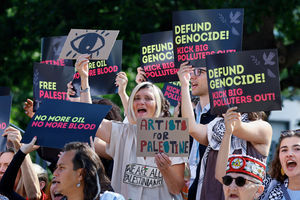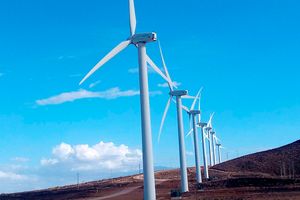The push for climate funds: Will rich countries pay?

Kenya’s Climate Change Envoy Ali Mohamed (front right) representing Kenya and Africa in Bonn, Germany during the SB60 conference.
What you need to know:
- According to climate activists also present in Bonn, the negotiation momentum to come up with a common ground for all the parties met huge resistance from countries in the developed world, who were seeking to give Africa a business deal based on loans, instead of direct support.
Kenya’s Climate Change Envoy Ali Mohamed is leading Africa in pursuit of $1.3 trillion (Sh167 trillion) annually from developed countries to be used for climate action on the continent and other developing countries despite resistance from the West.
Mr Ali, also the executive climate change advisor to President William Ruto, said: “We all saw floods that consumed almost a third of the whole country and beyond. We have witnessed fires that have destroyed villages and homes in different parts of the world. We have seen droughts that have decimated different parts of the world, and Kenya is not immune, storms and landslides, which are all caused by climate change.”
Mr Mohamed has since been elected the co-chair for the African Group of Negotiators (AGN).
Addressing journalists at the technical climate negotiation meeting of Subsidiary Bodies (SB60) in Bonn, Germany, ahead of the 29th round of negotiations (COP29) in Azerbaijan by the end of the year, Mr Mohamed said the developed world had an obligation to support Africa’s climate action for adaptation, mitigation, loss and damage and just energy transition.
However, this push may not be a walk in the park for Mr Mohamed and other negotiators from developing countries.
According to climate activists also present in Bonn, the negotiation momentum to come up with a common ground for all the parties met huge resistance from countries in the developed world, who were seeking to give Africa a business deal based on loans, instead of direct support.
Earlier in 2009 during the 15th Conference of Parties (COP15) of the UN Framework Convention on Climate Change (UNFCCC) in Copenhagen, developed countries agreed to mobilise $100 billion every year by 2020 to help developing countries cope with the impacts of climate crisis.
When parties endorsed the Paris Agreement at COP21 in 2015, they found it wise to set up another fund mobilisation infrastructure known as infrastructure for the New Collective Quantified Goal (NCQG), which, according to the agreement, has to be implemented at the forthcoming COP29, whose agenda has now been set at the SB60 in Bonn.
“Ideally, there will be no climate action anywhere without climate finance. Yet what we have seen is that developed countries are frustrating the process, blocking the United Arab Emirates (UAE) annual dialogues, which were agreed upon last year in Dubai, to focus on delivery of finance so as to give confidence to developing countries to implement climate actions,” said Mohammed Adow of Power Shift Africa.
According to the UNFCCC, the United Arab Emirates dialogue was created to focus on climate finance in relation to implementing the first Global Stoke Take (GST-1) outcomes, with the rationale of serving as a follow-up mechanism dedicated to climate finance, ensuring response to and/or monitoring of, as may be appropriate and necessary, all climate finance items under the GST.
“We came to Bonn with renewed hope that the NCQG discussions will be honest and frank; with all parties committed to seeing that the finance mechanism will be based on the priorities and needs of developing countries and support country-driven strategies, with a focus on Nationally Determined Contributions (NDCs) and National Adaptation Plans,” said Memory Zonde-Kachambwa, the executive director at the African Women's Development and Communication Network.
“Seeing the devastation that climate change is causing in our countries in terms of floods, storms, droughts, among others calamities, it was our hope that the rich countries will be eager and willing to indicate the Quantum as per article 9.5 of the Paris Agreement so as to allow developing countries plan their climate action,” she said.
However, Mr Mohamed is optimistic that there will be light at the end of the tunnel as the world heads to Baku, Azerbaijan for yet another round of negotiations. “Finance is a sensitive issue for many groups and there is resistance from the developed world. But the developing world under the Third South Summit of the G77 and China chaired by Uganda has been united on the need to ensure that there is delivery,” said Mohamed.
“The mandate of Baku is to deliver on the NCQG on climate finance, and there is no other way out apart from the global community agreeing on some terms,” he said, noting that “the discussion, therefore, is how it should be delivered and how much, with the African group pushing for delivery of $1.3 trillion per year”.
So far, Kenya, France and Barbados have formed an international tax task force to mobilise additional finance for equitable climate and development action. It brings different governments together to foster political will and advance options for international climate taxes.
“Through this tax task force, there is an opportunity to raise more funds from aviation, shipping, fuel taxation among many other potentials levies,” said Mr Mohamed. SBs are crucial because they are the scientific agenda setting sessions that determine what to be negotiated upon during the subsequent COP.





